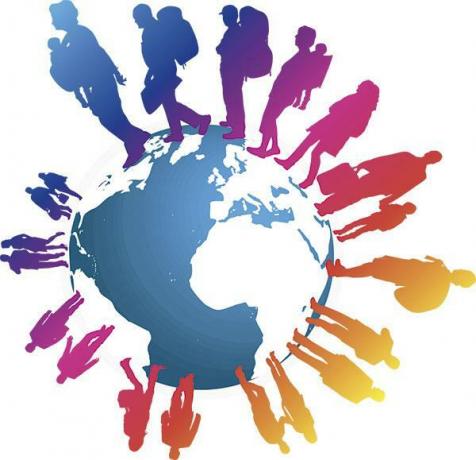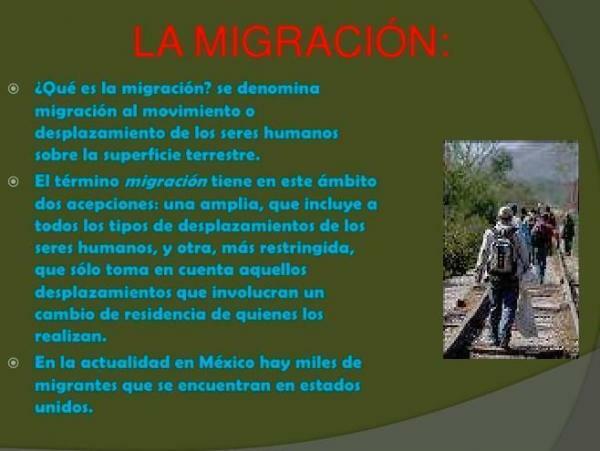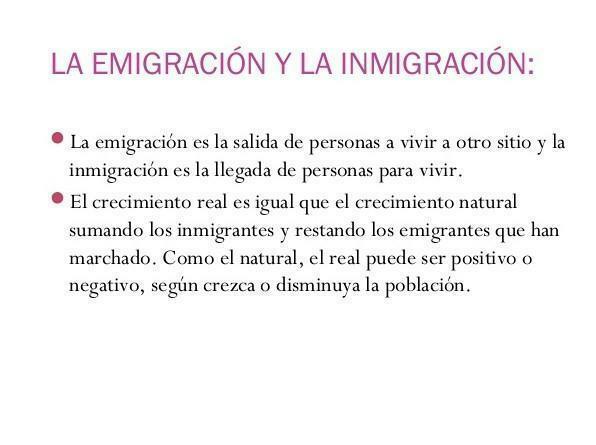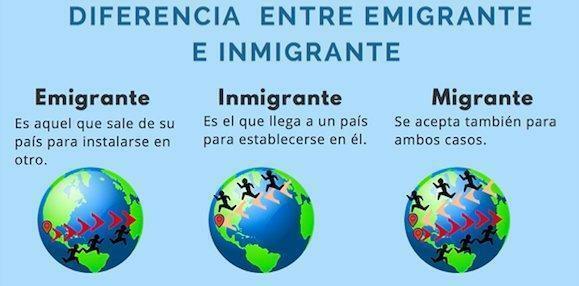Emigration and immigration: definition and differences

Image: ConceptDefinition.de
We currently live in a global world, a planet in which it is easier every day to cross the lines that separate countries. Every day it is more common for people from one country to go to another, in search of new opportunities. Due to the increase in this phenomenon, today in this lesson from a PROFESSOR we are going to talk about the definition of emigration and immigration with their differences. In this way, you will be able to better know what each of these terms consists of and what we refer to when we use one or the other.
Index
- 5 causes of immigration and emigration
- What are emigration and immigration?
- Differences between emigration and immigration
- Current data on emigration and immigration
5 causes of immigration and emigration.
Migrations are the movements that human beings have been making since Prehistory in which a person moves from his residence. The two main forms of migration are emigration and immigration, which have their origin in the creation of borders.
Migrations can take place for many reasons, and can be of a different nature depending on the situation. Some of the causes that cause migrations are the following:
- Political causes: These happen when, for reasons of ideology, a person is persecuted by the ruling regime of his country. These people are called political exiles, an example being the Spaniards who left the country after the Spanish Civil War.
- Cultural causes: The culture of a country, such as religion or traditions, can be a factor when deciding to leave a country.
- Social and economic causes: They are the main causes of human migration. Some of these causes are unemployment, poverty or improving the standard of living.
- Family causes: Being linked to a family from another region is also an important factor in migration.
- War causes: Wars are a great cause of migration, causing the displacement of large masses of the population.

Image: Slideshare
What are emigration and immigration?
To continue with this lesson on the definition and differences of emigration and immigration we must talk about the two main concepts in human migrations, that is, emigration and immigration.
What is emigration?
Emigration is the action in which a person leaves the country of origin to go to another country, either for economic or social reasons. Emigration is closely linked to immigration, being very similar concepts, since emigration ends where immigration begins. The emigrant can be defined as the person who leaves his country and moves to another region.
Emigration has been very different throughout history, since it has depended on the economic power of the countries, the worst economies being those with the most emigration. The human being has emigrated since its origins, since Homo Sapiens emigrated from Africa to the rest of the world, being the majority of the population of our planet descended from these emigrants Africans. There have been many massive emigrations throughout history, some of the most relevant being the following:
- Religious emigrations throughout the Middle Ages and Modern Ages.
- Emigrations as consequences of armed conflicts, for example the Spanish Civil War and World War II.
- Migrants as consequences of colonizations, for example the march of Spaniards towards America during the Modern Age.
- Emigration from Africa to Europe in recent years.
What is immigration?
On the other hand we find immigration, which is the action in which a person enters a country other than their own. People who leave their country often seek a better job, a better life, or flee the politics of their country. Immigration has a great relationship with emigration, since both are the same situation, although seen from a different perspective. An immigrant could be defined as a person who arrives in a foreign country from their country of origin. Immigration is the consequence of emigration, since emigration is leaving one's country and immigration is entering a new country.

Differences between emigration and immigration.
To understand both terms, it is essential to understand the differences between the two, since both words can be confused as they are closely related actions. Emigration is the departure of a person or a group of people from their country of origin, while immigration is the entry of these people to a different country. An emigrant is the one who leaves, an immigrant is the one who enters a new state.
A person is not an immigrant until he enters the new country, until that moment he is an emigrant, so if a person dies on the journey between the two regions, an emigrant dies since he has left the country, but not an immigrant, since not having arrived in the new country he has never become a immigrant.
For example: an Indian family that goes to the United States, when they leave India they become emigrants, but until they arrive in the United States they do not become immigrants.

Current data on emigration and immigration.
To understand current human migrations we must look at the emigration and immigration statistics in recent years, to know the countries with the highest number of emigrants and immigrants in our world today. In 2017 there were 244 million migrants around the world, a figure that increases every year, due to the increasingly global world in which we live.
On the one hand, the statistics on emigration show us that the countries that emigrate the most are Asians, being what they have the most presence in the data, although it must also be taken into account that they are countries with a large population. The list is made up largely of countries of large size and population, the exception being Syria, a country in which a quarter of its population lives outside the country.
The 10 countries with the most emigrants are as follows:
- 10. UK
- 9. Syria
- 8. Philippines
- 7. Ukraine
- 6. Pakistan
- 5. Bangladesh
- 4. China
- 3. Russia
- 2. Mexico
- 1. India
On the other hand, the 10 countries of the world with greater number of immigrants are as follows:
- 10. Spain
- 9. Australia
- 8. France
- 7. Canada
- 6. United Arab Emirates
- 5. UK
- 4. Saudi Arabia
- 3. Russia
- 2. Germany
- 1. USA
If you want to read more articles similar to Emigration and immigration: definition and differences, we recommend that you enter our category of Story.



